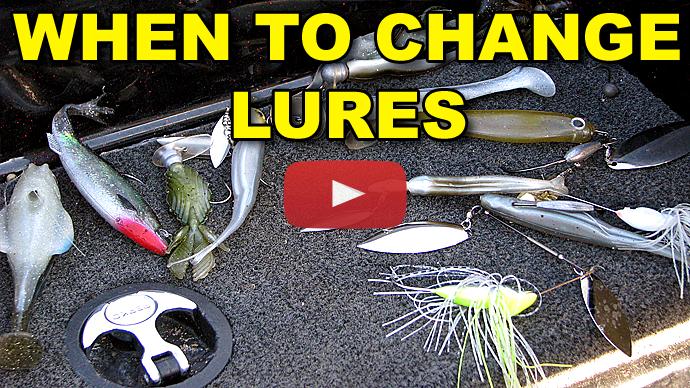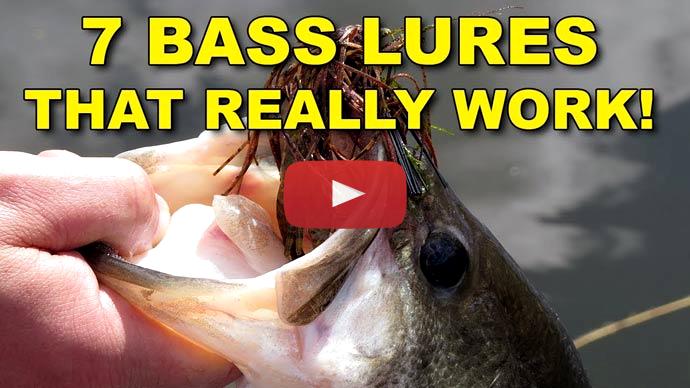Boy, now, that Maxscent did its job. He wouldn't bite it. I had to let it sit there for a while and let that do its thing. And he finally grabbed it, he kept playing with it, and playing with, and playing with, and then, finally, he said, "Yeah, that smells good, I think I'll eat that." Look at that. Good job. Look, he's got a little belly. He's been eating.
Hey, folks. Glenn May here with BassResource.com. And today I want to talk about scents and attractants, and do they really work? I get asked this question a lot, both from beginning anglers to experienced anglers alike, there's kind of a debate going on whether these things actually work. And, you know, there's reason to believe it does.
Scientists and biologists know that, bass, their sense is actually, sense of smell, is actually a thousand times better than a dog's, right? So, that little factoid in itself was like, well, of course, then, you know, scent is a huge factor. But you got to put that in context.
Bass, species, largemouth and small mouth, they're killing machines, man, they are predators. Their senses are highly fine tuned, the lateral lines, their sense of hearing, their sense of sight, sense of taste, smell, is all geared towards one thing, and that is finding prey and eating it. So, of course it makes sense that they have a heightened sense of smell. They have a heightened sense of hearing and sight too.
So where does sense of smell come in to factor especially when the bass is feeding? Well, bass are primarily sight feeders, right? If they can see it, you know, that's what they focus on when they go to strike something. Now, they use their sense of hearing and their lateral lines to perhaps sense something nearby or to find it, but they'll use their sense of sight to actually go in and hit it. As a last bit of information, they may use smell. When they get close to a bait or maybe it's a crawfish or something they expect it to smell a certain way. They may use that as a final okay signal to end up striking it.
I think scent is actually, for me, from what I've learned scent is actually, or sense of smell, is a little bit more about sensing danger, or things that turn off a bass. For example, we do know, biologists do know that oil, and gasoline, and nicotine, sunscreen, you know, all those things, the smell of those things turn off bass and make them not want to bite. So it's more important to keep your hands clean and make sure you don't get those kind of scents on your bait. But does it make them bite? Does it make them come in and actually bite a lure?
Well, I think what it does is it makes them hold on to the lure a little bit more, more so than it actually causes them to strike a lure. So, let's let's dive into this a little bit. And this is where we start to get into the debate.
It's hard to really pinpoint where the sense of smell comes into when it comes to artificial baits in bass fishing. A lot of it has to do with just the different attractants that are out there or scents that are out there. You got salt, you got garlic, you got anise, you've got pheromones, and, you know, fish scent, and crawdad scent, and whatever. It's a whole bunch of different ones out there. Some may be more effective than others.
Plus, the way that these are applied and in what material that they're infused in makes a big difference. Like there's some oil-based ones out there that you spray on the bait. I don't get those. Oil and water doesn't mix, so how is that scent diffused into the water where the fish can sense it? I don't know. Some are water-based. But again, if it's water-based, doesn't that mean it washes off quickly? Probably. And also, you see it when you cast. You'll see it spray on the water, it's like, wow, okay, how much of that is actually left on the bait? So how effective is that really?
Some of them you dip and it's supposed to infuse into the plastic. Well, if it's absorbed into the plastic, how much of that is being being emitted in the water? I don't know. Some others have like a gel or a paste that you put on, and that stays on really well, but, okay, if it stays on really well then how much of that is actually dissipating in the water? It's hard to say, right? It's hard to tell really what the fish is sensing here.
The other piece of it is, some of these come with dye as well. There's some baits some scents that have a dye on them. And who's to say that the dye didn't attract the fish and not the scent? Right? It's too hard to tell.
Okay, so, what does this all mean? What does this all mean when there's different types of scents and everything. This is why you get a big debate, because it's really hard to tell like what's really effective and what isn't. So this is what I've learned.
I've been using scents since Fish Formula that came out, and I was using Sparkle Scales, and I used to put that into a baggie and throw my plastics in and let it marinate overnight, you know, all the way up to today's modern stuff. And I've used that, and my wife and I have used it side by side.
Did we end up catching more fish because of it? I wouldn't say so. I would say that I've noticed fish tend to hold on to a bait a little bit longer if there's a scent on it. And again, some of these baits have scent infused in them, so why even bother putting a scent on it if it's already got a scent?
But there's a debate. Would you have caught that fish if you had scent on it or not? I mean, holding on to it longer seems like that gives more chance to set the hook. But would I have already set the hook anyway if that bait didn't have scent on it? It's debatable.
So, this is why there's a big debate about it. And even I don't have an answer for it. But what I can tell you is this, when the bite is really slow, and when the fishing is really tough, I know that scent doesn't hurt. And so I want to put all the odds in my favor. If I got a real slow moving bait that the fish has time to examine to look at. If I can put scent on it and it's going to give that fish an extra incentive to bite it, then I'll use scent. Fast moving lures I don't think really have much of an effect. But I will use it in those situations where the bite is really tough. And if it helps, great, but I know it isn't a deterrent.
So, I hope that helps. For more tips and tricks like this, visit BassResource.com.



